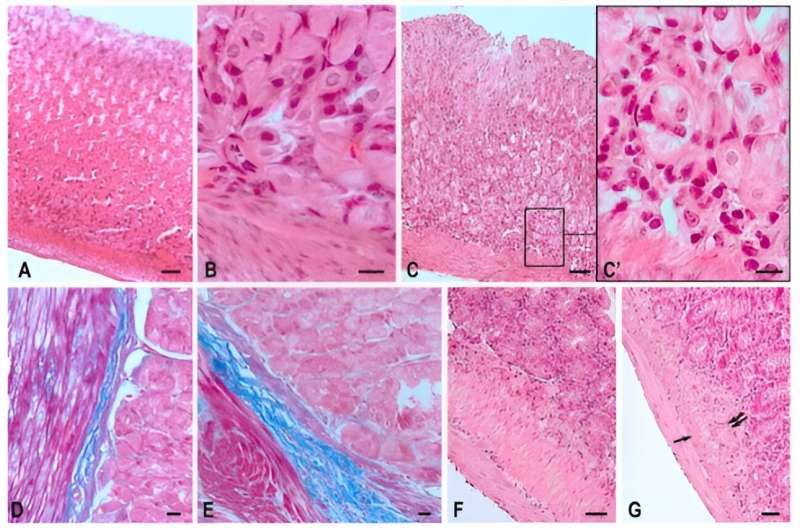This article has been reviewed according to Science X's editorial process and policies. Editors have highlighted the following attributes while ensuring the content's credibility:
fact-checked
peer-reviewed publication
trusted source
proofread
Scientists find that smooth muscles of the digestive system are sensitive to zero gravity

RUDN University scientists have discovered that in weightlessness, the contractile activity of smooth muscles in the hollow organs of the gastrointestinal tract is disrupted. New data must be taken into account when planning long-term space missions. The results were published in the International Journal of Molecular Sciences.
Weightlessness affects almost all physiological processes of the body. Therefore, for the development of new space projects and manned missions, it is important to understand exactly what kinds of changes occur in various body systems, primarily those most sensitive to changes in the usual level of earth gravity.
Some reactions of the gastrointestinal tract to weightlessness are already known—for example, a decrease in the evacuation function of the hollow organs of the digestive system, increased secretion of gastric juice, the development of edema of the mucous membranes, and more.
However, there is little data on how the smooth muscles of the gastrointestinal tract react to weightlessness. The researchers of this new work studied the mechanism of gravity sensitivity of the smooth muscles of the gastrointestinal tract.
"To develop manned flights, we need to take into account factors affecting the health of astronauts. Microgravity conditions affect most of the physiological functions of the body and are capable of causing significant changes in some cases, which is why the attention of most space biologists, physiologists, and physicians is focused on them," said Dmitrii Atiakshin, Doctor of Medical Sciences, head of the Research and Educational Resource Center for Immunophenotyping, Digital Spatial Profiling and Ultrastructural Analysis Innovative Technologies at RUDN University.
"Smooth muscle tissue takes an active part in the development of adaptation and pathological conditions, including the conditions of orbital flight. But, despite this, the mechanisms of its sensitivity to weightlessness conditions remain practically unexplored," continued Dr. Atiakshin.
The researchers, in collaboration with colleagues from the Research Institute of Experimental Biology and Medicine of Voronezh State Medical University, studied the smooth muscles of the fundus of the stomach and jejunum in rodents that spent several weeks in microgravity conditions. The study was conducted on mice after a 30-day space flight on board the BION-M No. 1 and Mongolian gerbils after 12 days in space on board the Foton-M No. 3. After the laboratory rodents landed safely, scientists examined the structures of the smooth muscle tissue of their organs.
The scientists found that after space flight, in rodents of both species, the production of the protein α-smooth muscle actin (αSMA), which is involved in smooth muscle contraction, decreased. For example, in the stomach muscles of Mongolian gerbils returning from space flight, the proportion of αSMA decreased by almost 15% compared with levels in comparison groups. To make sure that it was just weightlessness, the authors conducted additional tests to rule out other causes. The results suggest that GI smooth muscle is sensitive to weightlessness.
"Decreased intracellular actin production in the muscles of the stomach and jejunum indicates the high gravitational sensitivity of contraction of the hollow digestive organs. It poses new challenges for space gastroenterology and makes it advisable to continue this area of research. The results obtained must be taken into account to level out the adverse effects of the biological effects of factors that accompany astronauts during long orbital missions on board the ISS," concluded Dr. Atiakshin.
More information: Tatyana Samoilenko et al, Smooth Muscle Actin as a Criterion for Gravisensitivity of Stomach and Jejunum in Laboratory Rodents, International Journal of Molecular Sciences (2023). DOI: 10.3390/ijms242216539



















